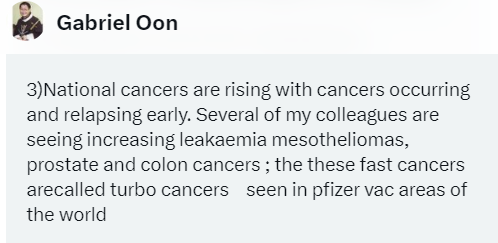In recent discussions surrounding the surge in aggressive cancer cases, often referred to as "Turbo Cancer," Dr. Maarten Fornerod is joining a growing assembly of oncologists and cancer experts who are raising serious concerns. They point to a troubling correlation between experimental mRNA gene therapy and the increase in these fast-progressing cancers.
A distinguished researcher whose expertise spans the intricate realms of cell biology and cancer genetics, Dr. Fornerod’s illustrious career has seen him make remarkable strides at prestigious institutions like the European Molecular Biology Laboratory and the Netherlands Cancer Institute. With an impressive portfolio of over 100 peer-reviewed articles, including seminal works published in top-tier journals such as Cell and Nature Genetics, his research has continually pushed the boundaries of science. Beyond the lab, Dr. Fornerod extends his influence as a scientific advisor and board member of the Netherlands Doctors Collective, where his insights help shape the future of medical research and policy.
Dr. Maarten Fornerod discussed a significant paper published on April 8, 2024, in the peer-reviewed journal Cureus, originating from Japan.
This retrospective study examines age-adjusted cancer mortality following the third mRNA lipid nanoparticle vaccine dose during the COVID-19 pandemic. Covering a substantial portion of the Japanese population, the study reveals an increase in cancer-related deaths from 2021 to 2022, compared to a continued decline from 2010 to 2020. Dr. Fornerod highlighted a particularly telling figure from the paper, which shows a steady decrease in cancer mortality until 2020, but a notable deviation and significant increase in 2021 and 2022, coinciding with successive rounds of mRNA vaccinations. The study plots cancer mortality against vaccination rounds, with statistically significant excess mortality appearing after the widespread administration of these vaccines mRNA gene therapy. Japan, being one of the most vaccinated countries, recently completed its seventh round of mRNA injections, further emphasizing the correlation observed in the study.
Indeed, Dr. Fornerod isn’t the only voice underscoring this growing concern. Renowned Professor of Oncology and Foundation Chair of Oncology at St. George's, University of London, Angus Dalgleish, has also brought attention to this critical issue. Professor Dalgleish has echoed similar findings, stressing the urgent need for comprehensive studies and immediate action to address the potential dangers associated with these experimental mRNA gene therapies.
Both experts, equipped with extensive backgrounds in oncology and clinical research, emphasize the importance of reevaluating the safety protocols and long-term impacts of these widely administered mRNA gene therapy. Their calls for caution are starting to resonate throughout the global medical community.
On the other side of the world, Prof. Masanori Fukushima, Emeritus Professor of Kyoto University and Japan's most senior oncologist, has also repeatedly condemned these experimental mRNA gene therapies.
Just this week, investigative journalist Sharyl Attkisson sat down with Dr. Nathan Goodyear, a medical doctor specializing in alternative treatments and integrative oncology, who shared insights into the alarming phenomenon of "Turbo Cancer".
Dr. Goodyear, who turned his professional focus to cancer treatment after developing a tumor in his adrenal gland, explained that "Turbo Cancer" refers to the rapid and aggressive nature of cancers observed over the past four years, particularly accentuated by the pandemic.
Distinguishing between pre-pandemic and post-pandemic cancer trends, Dr. Goodyear noted a stark difference: prior to the pandemic, cancer primarily affected individuals over the age of 50, and there was a general sentiment that progress was being made in the battle against it. However, post-pandemic, there has been a concerning shift with cancers appearing in younger populations, exhibiting more aggressive behaviors, and presenting in unusual ways. Dr. Goodyear cited rare cases, such as multiple men developing breast cancer within a short timeframe and individuals experiencing co-primary cancers like breast and pancreatic cancers simultaneously. Both Dr. Goodyear and his colleagues are observing these unprecedented patterns, challenging the ongoing narrative that dismisses the reality of these observations.
You have to take anecdotes seriously!
But I think anecdotes from clinicians you probably have to, have to take seriously because a good, a good doctor has you know, has experience and has some sort of filter, historical filter of when things are unusual.
Dr. Fornerod also points to compelling observations from front-line clinicians as part of the strong evidence linking mRNA gene therapy to increased cancer cases. Many doctors have reported noticing a spike in cancer incidences following booster doses or initial mRNA vaccinations. While some of these reports have been documented in the scientific literature as case studies, Dr. Fornerod acknowledges that they are anecdotal in nature. However, he emphasizes the importance of taking such anecdotes seriously, considering that seasoned doctors possess a wealth of experience and a historical understanding of what constitutes abnormal patterns. These clinicians' insights, refined by years of practice, should not be dismissed lightly, especially when they consistently highlight deviations from expected outcomes.
My friend, Professor Gabriel Oon, who is the founding president of Singapore’s Society of Oncology, sent me this message, alerting that several of his oncology colleagues are seeing increasing leukemia, mesotheliomas, prostate, and colon cancers. These are especially prevalent in highly Pfizer-vaccinated areas of the world.
Immunosuppressive effect caused by higher levels of IgG4
Dr. Fornerod continues by explaining how mRNA vaccines might contribute to the increase in cancer cases. He mentions that these vaccines are known to have a suppressive effect on the immune system, which is no longer a matter of debate. For example, the mRNA gene therapy can lead to higher levels of IgG4, a type of immune molecule, and generally weaken the immune system's ability to fight off threats. Since our immune system helps protect us against cancer, a weaker immune system means there's a higher chance for cancer to develop and grow unchecked.
If you're interested in following the development and understanding of IgG4's role in promoting Turbo Cancers, check out Dr. Mikolaj Raszek’s YouTube channel, where he closely tracks the latest scientific advancements on this topic.
DNA Contamination
Dr. Fornerod also addresses the issue of DNA contamination in mRNA vaccines, arguing that this is no longer a controversial topic. He emphasizes that DNA contamination poses a clear genotoxic risk, and any genotoxic risk inherently carries the potential for causing cancer. The debate has thus shifted from questioning whether it poses a carcinogenic risk to understanding the extent of the risk involved.
The issue of DNA contamination is now no longer disputed since it has been replicated across multiple independent labs around the world. (Thanks to Dr. Kenji Furukawa from Japan for the chart below!)
Interestingly, the only scientist who verified DNA contamination but emphasized that there is no concern, Dr. Nitta from the University of Tokyo, is also closely affiliated with Moderna.
Skyrocketing Cancer Related Insurance Claims
Ed Dowd shared insights from a second report on ResearchGate. The study analyzed various age groups, focusing particularly on ages 64 to 75, and uncovered notable findings. Chart number three showed no significant signal in 2020 but a clear deviation from the trend in 2021 and 2022. Specifically, the data indicated a negligible 0.1% decrease in 2020 for the age group, followed by a 4.8% increase (z-score of 10) in 2021, and an 11.5% increase (z-score of 24) in 2022.
[SOURCE]
Dowd pointed out that this stark shift requires investigation into events post-2020, starting in 2021. The study distinguished between underlying and multiple causes of death. In 2020, multiple causes of death showed a 3.4% increase, which was anticipated due to COVID-19 affecting already comorbid cancer patients. However, contrary to expectations of a decline in excess cancer deaths due to the "pull-forward" effect, the figures continued to rise dramatically: a 9.2% increase in 2021 and a 16.4% increase in 2022. This trend suggests a substantial and problematic increase in excess cancer deaths—both underlying and multiple causes—amounting to approximately 40,000 excess deaths in this age group for 2022 alone.
Health Economist and University of Lucerne's Prof. Dr. Konstantin Beck also echoed the same alarm on insurance claims in Swiss cancer cases.
Censorship remains a concern
Dr. Fornerod highlights a clear example of censorship in scientific discourse during the COVID era. He points to a preprint from May 2022 discussing the need to consider tissue-specific dysregulation of ER activity in the design of spike-based (mRNA) vaccines. In the final published version in November 2022, this critical concluding sentence was removed.
Dr. Fornerod suggests this omission is a form of censorship, potentially to avoid creating vaccine hesitancy. As an experienced reviewer, he notes it's unusual to ask authors to remove discussion points, reinforcing his belief that this is a deliberate act of censorship.
In addition to censorship, doctors who are bullies remain a significant blemish on the medical community, as I mentioned in my rant a couple of weeks ago.
Of Silent Doctors and Bullying Doctors
Recently, there were numerous new studies that raise concerns about the effects of mRNA. Feeling compelled by this, I took the initiative to reach out to several doctors. Some I know personally, and others I've been introduced to through referrals. They're all quite informed and, for the most part,
There is enough evidence now to stop the shots!
….there is enough, in my opinion, there's enough strong evidence linking mRNA vaccines to cancer. and then in addition to the safety signal of Japan to say, okay, it's time to stop!
Dr. Fornerod concludes by expressing his firm belief that there is sufficient strong evidence linking mRNA vaccines to cancer. Coupled with the safety signals reported in Japan, he advocates that it's time to put a halt on these vaccines to further investigate and ensure public safety.
Signing off for now
A17


















